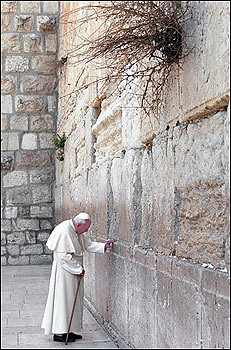My look at current events, politics, religion (esp. Judaism,) society, human interaction, and whatever else tickles my fancy. New posts will be added as I feel like it.
Wednesday, April 06, 2005
Pope John Paul II: Not just historic, but heroic
For a Jew, the institution of the papacy is a foreign concept. So one is tempted to ask: Why should the death of a pope be significant to us? Despite the lack of an institutional bond with the papacy, many of us still feel a sense of loss for John Paul II. We had disagreements with the man, to be sure, but we need to look at the bigger picture, and in this case, that picture was of a man who could teach lessons to all of humanity, regardless of creed.
Karol Wojtyla was a product of his times in the best possible sense. Born in southern Poland, he grew up in an environment where Jews and Catholics intermingled and interacted in each other’s lives. As a child, he had many Jewish friends. Earlier this week, an Israeli daily published a letter written by a Jewish childhood friend of the young Karol testifying not only to the closeness between the future pope and the Jews of his community, but also to the reunion of these old friends when John Paul made his pilgrimage to Israel in 2000. They maintained a personal correspondence ever since.
As a young man, he was profoundly influenced by the destruction of the Jews of Poland and Europe. A more cynical witness might have ascribed the decimation of European Jewry to historical errors of the Jews and found theological rationale for it. But throughout his life he preferred in this regard to drive theology towards building bridges and mending the ways of the past that led to such wholesale destruction. A Polish professor from Krakow’s ancient Jagiellonian University told me nearly 20 years ago of his personal experience as a seminary student of Wojtyla’s, about the future pope’s real love for Jews, his respect for Judaism, and his pain over the Shoah.
John Paul II may not have been a trailblazer when it came to building relations between the Roman Catholic Church and Jews. That honor must rest with John XXIII, who in the early 1960s convened the Second Vatican Council that promulgated numerous reforms, among them Nostra Aetate, a document that removed the basis for anti-Semitism from the theology and teachings of the Church. But if not a trailblazer, John Paul II was the enforcer in ways that few could imagine. He not only talked about relations with Jews, he set personal examples.
In 1986, he visited Rome’s major synagogue and embraced its rabbi. In his travels, he sought out leaders of Jewish communities. He established diplomatic ties with the State of Israel, an act that in fact defied the old theology of supercessionism, which believed that the Jews were exiled from their homeland for rejecting Jesus. And in a poignant moment, a humble pope stood alone, dwarfed by the stones of the Kotel, and prayed for forgiveness, and in keeping with the Jewish tradition, stuck a note between its cracks.
Several papal pronouncements declared anti-Semitism “a sin against God and man” and raised questions about the practice of proselytizing. And in our own greater Boston community, let us not forget how he honored Leonard Zakim, himself a builder of bridges, shortly before Zakim’s untimely death. To recount the ways in which he made efforts to heal the scars left by two millennia of hatred and bloodletting was not just historic, it was heroic. That heroism was already evident as a young priest who returned a Jewish child in the foster care of Christians during the Shoah to his Jewish family.
The pontificate of John Paul II did not stop at the work towards reconciliation between Catholics and Jews. This pope possessed a deep love for humanity and a profound drive towards social justice. It was not above this man, cloaked in the regalia of his high office, to sit in prayer with prisoners or to reach out to the downtrodden in society. He used his office to speak out against repressive regimes in ways that few religious leaders have done.
Certainly, there were moments of conflict between this pope and the Jewish community. But no one could ever accuse him of anti-Semitic animus. The following comment, made before a Jewish group, perhaps captures the spirit of his reign and his work towards reconciliation: “I am convinced, and I am happy to state it on this occasion, that the relationships between Jews and Christians have radically improved in these years. Where there was ignorance and therefore prejudice and stereotypes, there is now growing mutual knowledge, appreciation and respect. There is above all, love between us; that kind of love, I mean, which is for both of us a fundamental injunction of our religious traditions… Love involves understanding. It also involves frankness and the freedom to disagree in a brotherly way where there are reasons for it.”
There is a tension in some traditional religious communities, Jews among them, to isolate the community from “outsiders” to protect it from influences of the outside world. There is also a fundamental flaw in such a mindset. While one always runs a risk through exposure to outside ideas, perhaps one runs a greater risk by fostering ignorance, which fosters hatred, which fosters bloodshed. From the openness of Karol Wojtyla and the Jews of his native Wadowice, the world would learn lessons of hope for humanity, the dignity of difference and the respect for that which was created in the Divine image. May his successors to the throne of St. Peter have the strength and courage to carry on in that spirit.
Yehi zichro baruch. May his memory be a blessing.
Subscribe to:
Posts (Atom)
